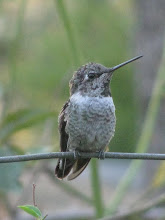I don't know if horses pray, but they certainly do have their heads bowed a lot! Except I'm pretty sure they're eating, not praying.
The reason for this particular post is to explain why I use the name Praying Horse. It is all based on a tattoo I gave myself for my fortieth birthday (fine, that would be 12 years ago) of a naked woman on horseback praying to the moon. I got it during a time when I was recovering from a relatively nasty horse wreck, i.e. I fell off and it hurt for a long time after, and wanted to celebrate my forgiveness for both the pain and the horse who tossed me off.
The image of has thus far resisted being captured via photograph but perhaps someday if I ask nicely enough, the pair will grace this page.
Friday, July 18, 2008
Sunday, July 13, 2008
Food Reinforcement Genetically Related to Obesity?
 I’m going to be writing about a book I’ve finished about normal eating, but while reviewing a blog post by the author of that book, I found a reference to something that gave me an ah ha! moment. She referred to a study that found a genetic component to the strong urges some of us have to overeat that may make eating more rewarding to those who have this component. (By the way, her post calls it a willpower gene, which I would have never used because I think there's will and there's willpower and they aren't the same thing, but that's for another post.)
I’m going to be writing about a book I’ve finished about normal eating, but while reviewing a blog post by the author of that book, I found a reference to something that gave me an ah ha! moment. She referred to a study that found a genetic component to the strong urges some of us have to overeat that may make eating more rewarding to those who have this component. (By the way, her post calls it a willpower gene, which I would have never used because I think there's will and there's willpower and they aren't the same thing, but that's for another post.)Here is a quote from the first paragraph of the published article: “Eating is a highly reinforcing activity, and there are individual differences in the reinforcing efficacy of food that may relate to differences in eating and energy intake. In the same way that the reinforcing efficacy of a drug is related to drug consumption, subjects who find food highly reinforcing may consume more energy in an ad libitum eating situation than those who are low in food reinforcement.” Further, “ The reinforcing value of food is related to activity of the dopaminergic system. Food consumption increases brain dopamine levels in animals and humans.”
Evidently, this study found that those who find food highly rewarding tend to have a particular genotype. And typically, this means that they would be more interested in and more motivated to eat, and would then eat more.
If I were to guess, I would say that I have this gene. My husband and I are a classic example of the dichotomy between those who live to eat and those who eat to live. I, of course, live to eat. I love food, I love to think about it, talk about it, cook it and eat it. My husband is not like that – he eats to live. Oh, he likes food and enjoys the good taste and all and has his favorites, but if he’s not hungry he could care less and spends no time thinking about eating.
Not only that but given my family history of alcoholism and other addictive and obsessive behavior patterns, makes me inclined to think that this is a possibility. Am I grasping at straws to explain my own poor behavior related to eating? Maybe so. On the other hand, knowing that there may be genetics behind the problem takes the pressure off feeling like such a “failure” all those years for being fat. One of the biggest factors in my weight loss was in successfully (for the most part) getting a grasp of the emotional aspects of using food to soothe upsets and depression. Another big factor in conquering the overeating urge was exercise – because, of course, it turns on the endorphins, and makes you feel good. Just one more reason to get off our butts and go Do Something!
Note: the strawberry has nothing to do with the content of this post, it's just that I bought a new digital camera, I'm learning how to use it, and I'm imposing the results on you, lucky reader.
Subscribe to:
Comments (Atom)






